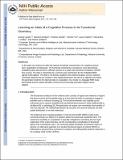Learning an Atlas of a Cognitive Process in Its Functional Geometry
Author
Langs, Georg
Lashkari, Danial
Sweet, Andrew
Rigolo, Laura
Golland, Polina
Published Version
https://doi.org/10.1007/978-3-642-22092-0_12Metadata
Show full item recordCitation
Langs, Georg, Danial Lashkari, Andrew Sweet, Yanmei Tie, Laura Rigolo, Alexandra J. Golby, and Polina Golland. 2011. “Learning an Atlas of a Cognitive Process in Its Functional Geometry.” Information Processing in Medical Imaging: 135–146. doi:10.1007/978-3-642-22092-0_12.Abstract
In this paper we construct an atlas that captures functional characteristics of a cognitive process from a population of individuals. The functional connectivity is encoded in a low-dimensional embedding space derived from a diffusion process on a graph that represents correlations of fMRI time courses. The atlas is represented by a common prior distribution for the embedded fMRI signals of all subjects. The atlas is not directly coupled to the anatomical space, and can represent functional networks that are variable in their spatial distribution. We derive an algorithm for fitting this generative model to the observed data in a population. Our results in a language fMRI study demonstrate that the method identifies coherent and functionally equivalent regions across subjects.Other Sources
https://www.ncbi.nlm.nih.gov/pmc/articles/PMC3222689/Terms of Use
This article is made available under the terms and conditions applicable to Other Posted Material, as set forth at http://nrs.harvard.edu/urn-3:HUL.InstRepos:dash.current.terms-of-use#LAACitable link to this page
http://nrs.harvard.edu/urn-3:HUL.InstRepos:29353644
Collections
- HMS Scholarly Articles [17922]
Contact administrator regarding this item (to report mistakes or request changes)



